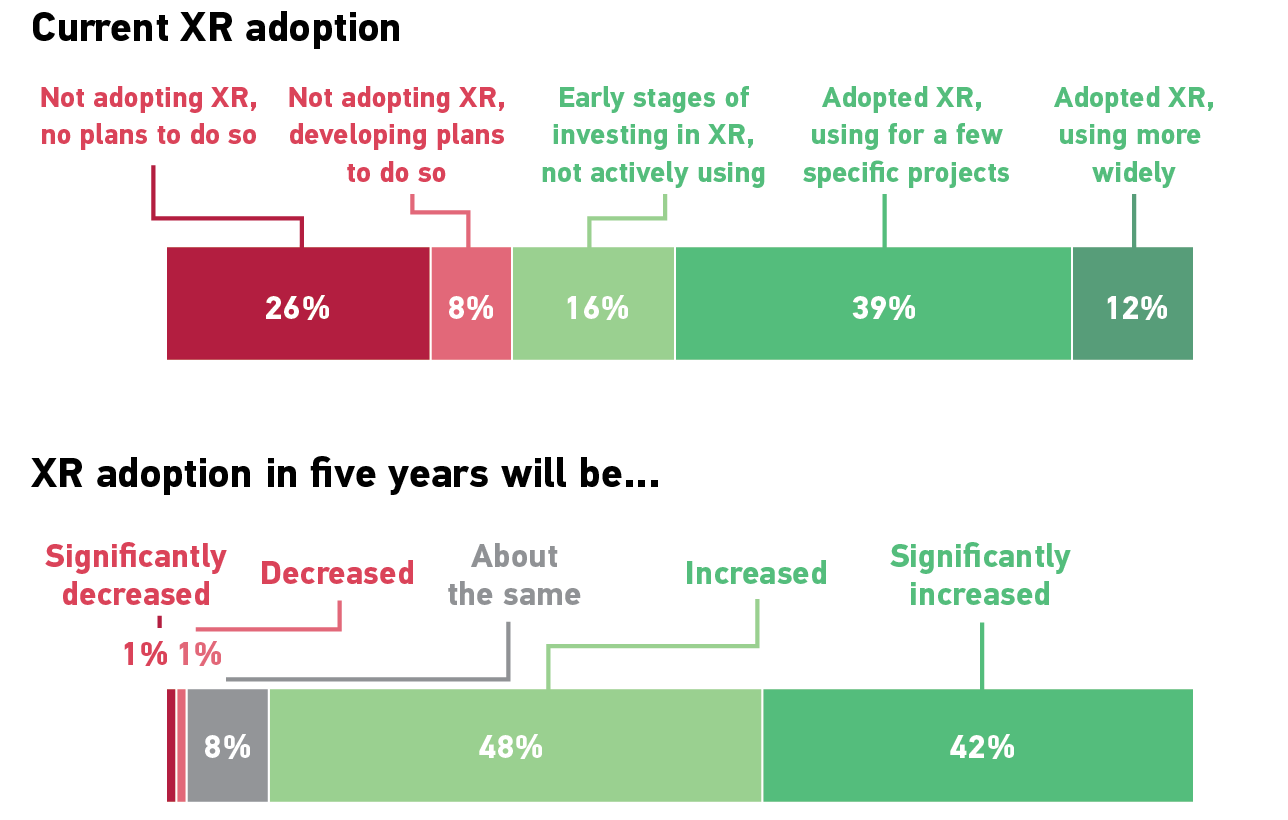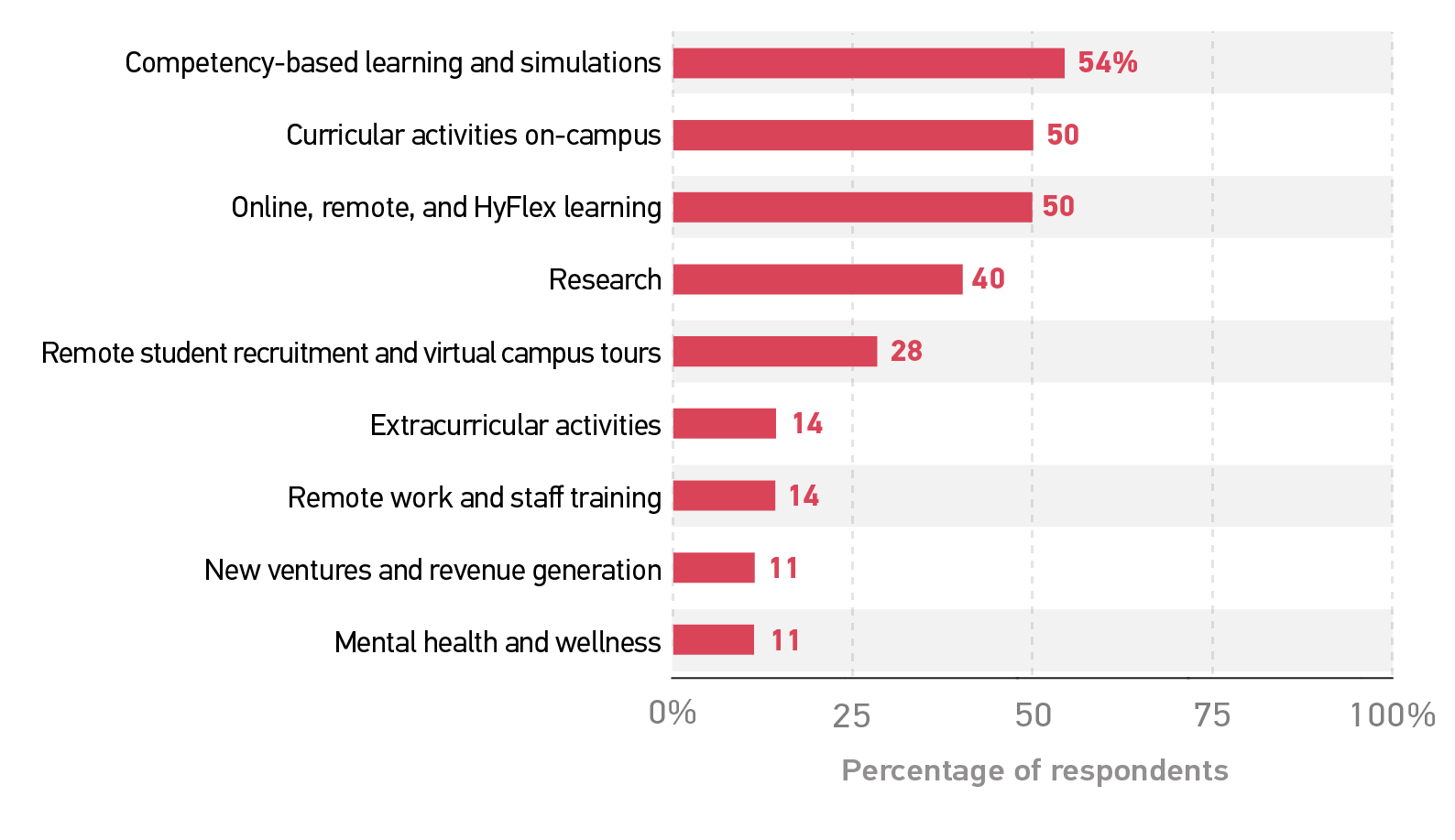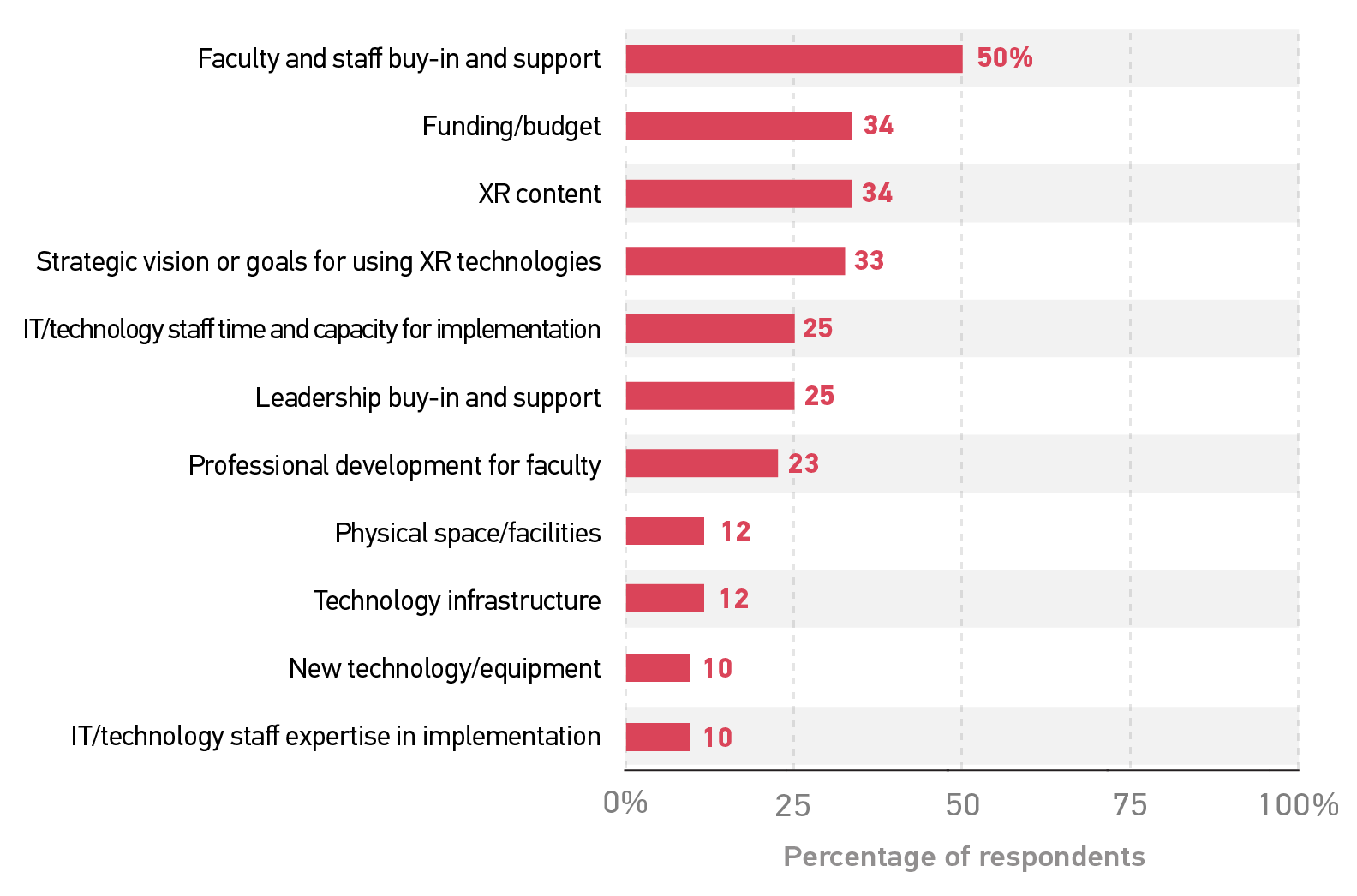Dec
2021
EDUCAUSE QuickPoll XR Technology
EDUCAUSE QuickPoll Results: XR Technology
https://er.educause.edu/articles/2021/12/educause-quickpoll-results-xr-technology



Digital Literacy for St. Cloud State University
https://er.educause.edu/articles/2021/12/educause-quickpoll-results-xr-technology



https://www.surveygizmo.com/s3/5155654/IT-Issues-2020?sguid=60122224
what i find most important:
Future IT Workforce: Deploying a broad array of modern recruitment, retention, and employment practices to develop a resilient IT talent pipeline for the institution
Digital Integrations: Ensuring system interoperability, scalability, and extensibility, as well as data integrity, security, standards, and governance, across multiple applications and platforms
Engaged Learning: Incorporating technologies that enable students to create content and engage in active learning in course curricula
Student Retention and Completion: Developing the capabilities and systems to incorporate artificial intelligence into student services to provide personalized, timely support
Administrative Simplification: Applying user-centered design, process improvement, and system reengineering to reduce redundant or unnecessary efforts and improve end-user experiences
Improved Enrollment: Using technology, data, and analytics to develop an inclusive and financially sustainable enrollment strategy to serve more and new learners by personalizing recruitment, enrollment, and learning experiences
Workforce of the Future: Using technology to develop curriculum, content, and learning experiences that prepare students for the evolving workforce
Holistic Student Success: Applying technology and data, including artificial intelligence, to understand and address the numerous contributors to student success, from finances to health and wellness to academic performance and degree planning (my note: this is what Christine Waisner, Mark Gill and Plamen Miltenoff are trying to do with their VR research)
Improved Teaching: Strengthening engagement among faculty, technologists, and researchers to achieve the true and expanding potential of technology to improve teaching
Student-Centric Higher Education: Creating a student-services ecosystem to support the entire student life cycle, from prospecting to enrollment, learning, job placement, alumni engagement, and continuing education
he EDUCAUSE Blended and Online Learning Constituent Group Listserv
Quick poll – do you require your faculty to be trained how to teach online before they are allowed to teach an online course at your institution?
Kristen Brown, Assistant Director, UofL Online
YES. Our faculty are required to complete two classes. One on using the LMS and the other is a 5-week moderated course called Teaching Online. Both courses are offered online.
Linda C. Morosko, MA Director, eStarkState Division of Student Success
Chad Maxson, EdD │ Dean of Online Learning, Olivet Nazarene University │ Center for Teaching and Learning One University Avenue │ Bourbonnais, IL 60914
Gina Okun Assistant Dean, Online Berkeley College 64 East Midland Avenue, Suite 2 Paramus, NJ 07652
The online academic program director (i.e. MBA, M.Ed.) and I meet with each new instructor to go materials that cover providing instructor presence and best practices in general. I also ask that they sign something that lists 14 online teaching practices we expect as an institution. They also have to complete some LMS training so that they can post announcements, participate in discussions, and manage their gradebook.
We are currently designing a more formal 6 hour online training that is required.
Course design is separate and that’s a 16 week process with our designers.
Tex Brieger Director of Distance Education (814) 871-7134
Absolutely. Also, we give them a stipend to attend the training and develop and online course.
Linda S. Futch, Ed.D. Department Head, Course Design and Development Center for Distributed Learning University of Central Florida
I think the bigger need is for ongoing training for recertification to teach online as technology and online pedagogical models evolve over time.
At Suffolk yes, we do. Over time that went from essentially “how to make the LMS work” to a Faculty Academy where faculty spend an entire semester working as a cohort to examine online pedagogy and best practices. The latter works much better for sound course development.
Doug Kahn College Assistant Dean for IT Operations Suffolk County Community College 533 College Road Selden, NY 11784
I can’t speak of other accrediting bodies, but SACS-COC is fairly clear in its documentation that faculty should be adequately trained before teaching online. Prior to my arrival at U of R in 2015, I worked for 20 years at E. Carolina U. which has a large assortment of online programs and courses. I assisted in the process of designing several online training modules that were to serve as “basic training” (with assessments) for online instructors…directly due to needing to meet accreditation guidelines. As part of documentation for reaffirmation/reaccreditation, had to provide documentation showing that faculty had successfully completed the training. I believe it is required to complete every three years.
Michael Dixon, Assistant Director Center for Teaching, Learning & Technology University of Richmond
I wish we did, but we do not. We run up against contract issues with. Certainly, this could be changed with institutional will but would require a shift in how our agreements with the faculty union.
TRAVIS FREEMAN, MFA EDUCATIONAL DEVELOPER FACULTY AND CURRICULUM DEVELOPMENT CENTRE (FCDC) Office Location: 113 McCaul St, Room 501 T 416 977 6000 x3358 E tfreeman@ocadu.ca
+++++++++++++++
more on online teaching in this IMS blog
https://blog.stcloudstate.edu/ims?s=online+teaching
pro domo sua
In one sense, the LMS has been a huge success. In just a few years starting in the late 1990s, purchases by colleges of these systems went from zero to some 90 percent of all American institutions.
Actual adoption by professors, however, has been a different, slower story. Just over half of students reported using an LMS in most or all of their courses as recently as two years ago, two decades after the creation of modern learning-management software. In short, professors aren’t as sold on using an LMS as administrators are.
Gamification Mechanic Benefits Each gamification mechanic result in one or more benefits.
Gamification Personality Types
People are motivated to play games differently.
Explorers: Pride themselves in exploring all facets of a game or the context surrounding it.
Killers: Driven by player vs player competition. Always comparing themselves to others.
Socializer: Prefers to chat, play cooperatively, and share game experiences with others.
Achievers: Look to achieve all objectives available in a game. Desires to beat the game itself.
==========================
Adaptive learning systems provide each student with a personalized learning experience, adapting the presentation of the content, and possibly the assessment to the individual ability of the student
==============================================
=============================
=============================
slide 11: Two primary design goals supported through Data Visualization:
–What story is the data telling you
–Identify patterns and exceptions
–Compare, contrast, choose
–Explain, make a point, decide
slide 15:
qTo communicate
qPresent more clearly or more forcefully than would be accomplished with text or tables
qReports, dashboards, infographics, etc.
qTo discover
qAllow us to see what would be difficult or impossible to see if not presented in a useful visualization
qRealm of research but moving into the mainstream
qCan same visualization serve both purposes?
======================
========================
==============================
https://drive.google.com/file/d/0B4vcm8Bg5pkcWFlaQ1J3b3duc2M/view
5. Using small unmanned aerial vehicles today is similar to the “fair use” of media
http://www.dronesurvivalguide.org
Resources – Higher Ed Drone Policies
The Ohio State University
Iowa State University
Indiana University
University of Kansas
Penn State University
University of New Mexico
The Association of College and University Policy
Administrators (ACUPA, acupa.org)
===================
From: The EDUCAUSE Blended and Online Learning Constituent Group Listserv [BLEND-ONLINE@listserv.educause.edu] on behalf of Meagher, Tina [meagher@XAVIER.EDU]
Sent: Wednesday, February 12, 2014 11:44 AM
To: BLEND-ONLINE@listserv.educause.edu
Subject: [BLEND-ONLINE] Synchronous solutions..
Hello,
I am leading a project group that is looking into a synchronous solution for student to students and faculty to student interactions. We recently started to use Canvas for our LMS and slowly moving away from Bb. Many of the faculty were using Wimba for synchronous classes and moments. Now faculty and students are using a combination of Big Blue Button, Webex, Skype and Google hangouts. We are trying to find a single solution for this. Can anyone let me know what they are using at their school for synchronous classes or moments, student group work and virtual office hours. Thanks so much for your time…
Tina
——-
Tina Meagher
Manager
Video and Digital Media Services
The Digital Media Lab
T: (513) 745-3682
Xavier University
3800 Victory Parkway, Cincinnati, OH 45207-0000
http://www.zoom.us/ + https://canvas.instructure.com/login
free webinar: ‘How to facilitate effective group work at business schools’ on May 5 at 1PM ET.
This webinar will gather teachers and instructional designers from business schools in a panel discussion to share and exchange ideas on improving group dynamics and social loafing in team based education.
We’re happy to welcome Mustafa Elsawy, Learning Technologist from Georgia State University and Jeff Webb, Associate Professor from David Eccles School of Business as guest speakers for the discussion to share their insights on:
You can learn more about the event on our website and register for free here.
++++++++++++++++++++++
more on online ed in this IMS blog
https://blog.stcloudstate.edu/ims?s=online+education
Identifying Badges that Add Value to Your Institution
11:30 a.m. – 12:30 p.m.
Our faculty will establish a shared terminology, discuss the benefits and challenges of various badges, and explain how each type can advance the goals of your institution and best serve students. You will share your purposes for pursuing a badging initiative, identify the types of badges that could add the most value to your institution, and set goals for the conference.
Designing Quality Alternative Credentials
2:30 – 3:15 p.m.
What goes into developing, designing, assessing, and maintaining quality microcredentials? In this session, you will learn about:
Funding and Monetizing Badges
11:00 a.m. – 12:00 p.m.
Many institutions are looking into badging as a potential revenue stream during lean times. During this hour, you will learn strategies for monetization. We will also look at various fee-based and tuition-based funding models to financially operationalize microcredentialing.
Marketing and Branding
1:30 – 2:15 p.m.
How do you articulate the value proposition of badges to internal and external stakeholders? During this session you will learn how to brand and market your microcredentials. You will study badge images and stacking considerations that will help you create the best design for your circumstances.
Jeff currently serves as a program manager for digital credentials initiatives at IMS Global Learning Consortium. Jeff leads projects and programs related to digital badges, comprehensive learner records, and the interoperability of learning technologies. Jeff is also co-chair of the EDUCAUSE Microcredentials and Badges Constituent Group.
+++++++++++++
More on microcredentials in this IMS blog
https://blog.stcloudstate.edu/ims?s=microcredentials